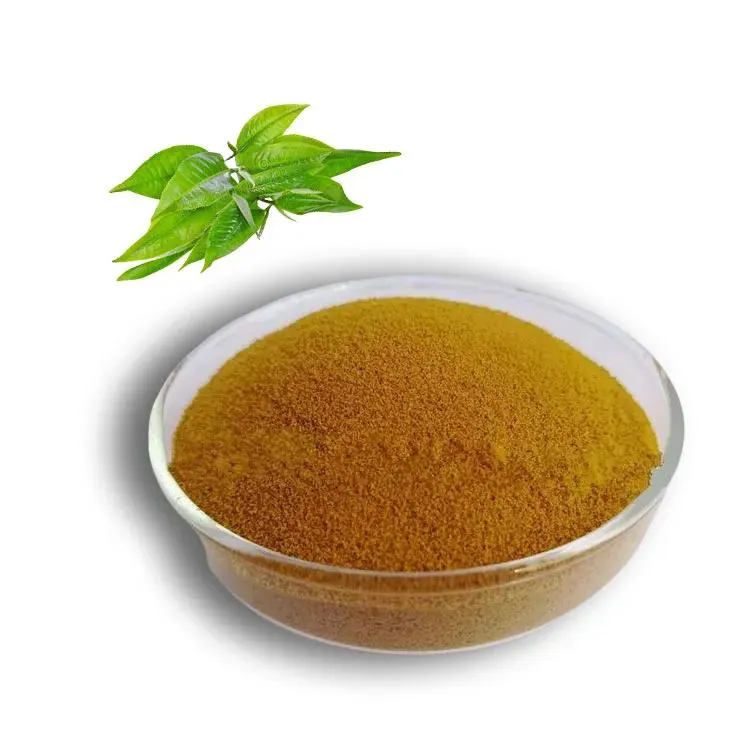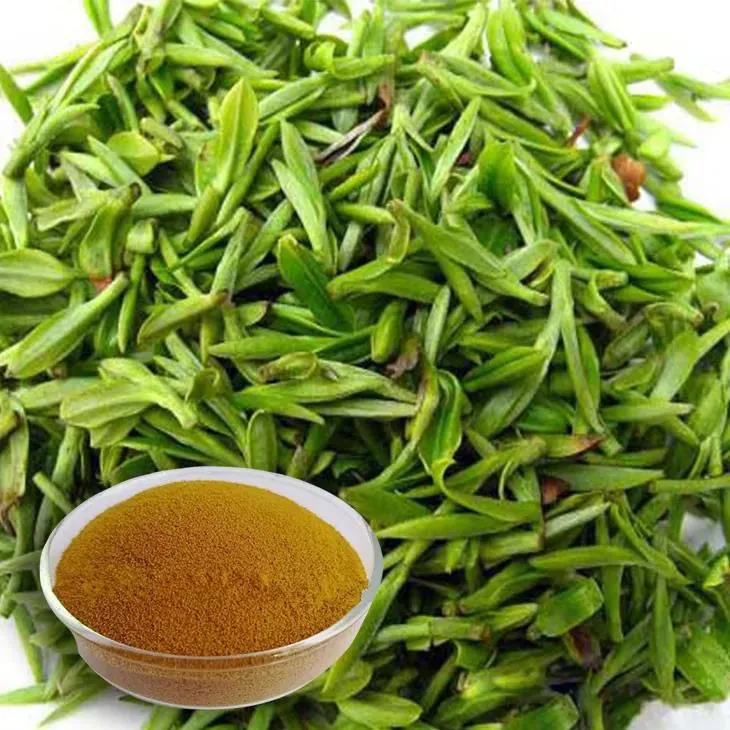- 0086-571-85302990
- sales@greenskybio.com
5 Effects of Green Tea Extract + Dosage, Side Effects
2024-11-12

1. Introduction
Green tea has been consumed for centuries in many Asian cultures, not only for its refreshing taste but also for its potential health benefits. Green Tea Extract is a concentrated form of green tea that contains a high amount of bioactive compounds. In recent years, it has gained significant popularity in the Western world as a dietary supplement. This article will explore the five main effects of Green Tea Extract, as well as its appropriate dosage and potential side effects.

2. The Five Key Effects of Green Tea Extract
2.1 Weight Reduction
Green tea extract can play a significant role in weight management. One of the main reasons is its effect on metabolism. It contains catechins, such as epigallocatechin - 3 - gallate (EGCG), which are believed to boost the body's metabolic rate.
- EGCG may increase the activity of enzymes involved in fat oxidation. This means that the body is able to break down fat more efficiently, leading to a reduction in body fat over time.
- It also has an impact on thermogenesis, which is the process by which the body generates heat. By increasing thermogenesis, the body burns more calories at rest.
- Some studies suggest that green tea extract can suppress appetite. It may interact with hormones in the body that regulate hunger, such as ghrelin, helping to reduce food cravings.
2.2 Anti - Aging Effects via Antioxidants
Green tea extract is rich in antioxidants, which are crucial for combating the signs of aging. Antioxidants work by neutralizing free radicals in the body. Free radicals are unstable molecules that can cause damage to cells, DNA, and proteins.
- Catechins in green tea extract are powerful antioxidants. They can protect the skin from damage caused by environmental factors such as UV radiation, pollution, and smoking.
- These antioxidants also play a role in maintaining the health of internal organs. By reducing oxidative stress, they may help prevent age - related diseases such as heart disease, cancer, and neurodegenerative disorders.
- On the skin, green tea extract can improve elasticity and reduce the appearance of wrinkles. It promotes collagen production, which is essential for keeping the skin firm and youthful.
2.3 Benefits for the Cardiovascular System
Green tea extract offers several benefits to the cardiovascular system.
- It helps to lower blood pressure. The catechins in green tea extract may cause blood vessels to relax, reducing the resistance in the arteries and thus decreasing blood pressure.
- Green tea extract can also improve blood lipid profiles. It may lower levels of LDL (bad) cholesterol and triglycerides, while increasing HDL (good) cholesterol. This helps to reduce the risk of atherosclerosis, a condition in which plaque builds up in the arteries.
- Another important aspect is its anti - inflammatory properties. Inflammation in the blood vessels can contribute to the development of cardiovascular diseases. Green tea extract can reduce inflammation, protecting the heart and blood vessels.
2.4 Improves Cognitive Abilities
Green tea extract has been shown to have positive effects on cognitive function.
- The catechins in green tea extract can cross the blood - brain barrier. Once in the brain, they may protect neurons from damage and improve synaptic plasticity, which is important for learning and memory.
- It has also been associated with a reduced risk of neurodegenerative diseases such as Alzheimer's and Parkinson's. The antioxidants in green tea extract can help to clear away toxic proteins that accumulate in the brain in these diseases.
- Some studies suggest that green tea extract can enhance attention and concentration. This can be beneficial for individuals in both academic and work settings.
2.5 Nourishes the Skin
Green tea extract is beneficial for skin health in multiple ways.
- As mentioned before, it promotes collagen production, which is crucial for maintaining the skin's structure and elasticity.
- It has antibacterial and anti - fungal properties, which can help to treat and prevent skin infections. This is especially useful for conditions such as acne and athlete's foot.
- Green tea extract can also soothe irritated skin. It has anti - inflammatory effects on the skin, reducing redness and swelling.

3. Dosage of Green Tea Extract
Determining the appropriate dosage of green tea extract can be complex, as it depends on several factors.
- For general health benefits, a typical dosage is around 250 - 500 mg per day. This can be taken in capsule or powder form.
- If the goal is weight loss, some studies suggest that a higher dosage of up to 1000 mg per day may be more effective. However, it is important to note that higher dosages may also increase the risk of side effects.
- When using green tea extract for skin health or anti - aging purposes, a dosage of 300 - 500 mg per day is often recommended. This can be combined with topical applications of green tea - based products for enhanced results.

4. Side Effects of Green Tea Extract
While green tea extract is generally considered safe for most people, there are some potential side effects to be aware of.
- One of the most common side effects is stomach upset. This can include symptoms such as nausea, vomiting, and abdominal pain. To reduce the risk of stomach upset, it is recommended to take green tea extract with food.
- Green tea extract contains caffeine, although in lower amounts than coffee. For some people, this can cause symptoms such as jitters, insomnia, and increased heart rate. If you are sensitive to caffeine, you may need to choose a decaffeinated version of green tea extract or limit your intake.
- In rare cases, green tea extract may interact with certain medications. For example, it can interfere with the absorption of some drugs, such as blood thinners. If you are taking any medications, it is crucial to inform your doctor before using green tea extract.
- High - dose or long - term use of green tea extract may also cause liver damage in some individuals. However, this is relatively rare and more likely to occur with very high dosages or in people with pre - existing liver conditions.
5. Conclusion
Green tea extract offers a wide range of potential health benefits, including weight reduction, anti - aging, cardiovascular protection, cognitive improvement, and skin nourishment. However, it is important to use it in the appropriate dosage to maximize benefits and minimize side effects. Always consult a healthcare professional before starting to take green tea extract, especially if you have any health concerns or are taking other medications.
FAQ:
What are the specific mechanisms by which green tea extract aids in weight reduction?
Green tea extract contains compounds like catechins, particularly epigallocatechin gallate (EGCG). EGCG can boost metabolism by increasing thermogenesis in the body. It also helps in reducing the absorption of fat in the digestive tract and may regulate certain hormones related to appetite, thus contributing to weight loss.
How does green tea extract have anti - aging effects through antioxidants?
Antioxidants in green tea extract, such as catechins, combat free radicals. Free radicals are unstable molecules that can damage cells, proteins, and DNA. By neutralizing these free radicals, green tea extract helps prevent oxidative stress - related damage to cells, which is associated with aging processes. This includes reducing wrinkles, improving skin elasticity, and protecting internal organs from age - related degeneration.
What are the ways in which green tea extract benefits the cardiovascular system?
Green tea extract may help lower blood pressure by relaxing blood vessels. It also has the potential to reduce bad cholesterol (LDL) levels while increasing good cholesterol (HDL) levels. Additionally, it can have anti - inflammatory effects in the blood vessels, which helps in preventing the formation of plaques and reduces the risk of heart disease and stroke.
How does green tea extract improve cognitive abilities?
The catechins in green tea extract can cross the blood - brain barrier. Once in the brain, they may have neuroprotective effects. They can reduce inflammation in the brain, protect neurons from damage, and enhance neurotransmitter function, which in turn can improve memory, attention, and overall cognitive performance.
What is the appropriate dosage of green tea extract?
The appropriate dosage of green tea extract can vary depending on factors such as individual health, the purpose of use, and the specific product. Generally, for general health benefits, a dosage of 200 - 300 mg per day of green tea extract (standardized to contain a certain percentage of catechins, usually around 50 - 90%) may be considered. However, it is always best to consult a healthcare provider before starting any new supplement regimen.
What are the possible side effects of green tea extract?
Some possible side effects of green tea extract include nausea, stomach upset, and insomnia, especially if taken in large amounts. Green tea extract also contains caffeine, so excessive consumption may lead to symptoms associated with caffeine over - intake, such as jitteriness and increased heart rate. In some cases, it may interact with certain medications, so it's important to inform your doctor if you are taking it while on other medications.
Related literature
- The Health Benefits of Green Tea Extract: A Review"
- "Green Tea Extract and Cardiovascular Health: Recent Research Findings"
- "Antioxidant Properties of Green Tea Extract and Their Impact on Skin Aging"
- ▶ Hesperidin
- ▶ Citrus Bioflavonoids
- ▶ Plant Extract
- ▶ lycopene
- ▶ Diosmin
- ▶ Grape seed extract
- ▶ Sea buckthorn Juice Powder
- ▶ Fruit Juice Powder
- ▶ Hops Extract
- ▶ Artichoke Extract
- ▶ Mushroom extract
- ▶ Astaxanthin
- ▶ Green Tea Extract
- ▶ Curcumin
- ▶ Horse Chestnut Extract
- ▶ Other Product
- ▶ Boswellia Serrata Extract
- ▶ Resveratrol
- ▶ Marigold Extract
- ▶ Grape Leaf Extract
- ▶ New Product
- ▶ Aminolevulinic acid
- ▶ Cranberry Extract
- ▶ Red Yeast Rice
- ▶ Red Wine Extract
-
Black Pepper Extract
2024-11-12
-
Citrus Aurantii Extract
2024-11-12
-
Astaxanthin
2024-11-12
-
Garcinia Cambogia Extract
2024-11-12
-
Gynostemma pentaphyllum extract
2024-11-12
-
Soy Extract
2024-11-12
-
Fenugreek Extract Powder
2024-11-12
-
Hops Extract
2024-11-12
-
Plantain extract
2024-11-12
-
Wheat Germ Extract
2024-11-12





















